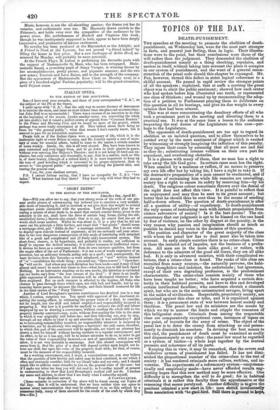"SHORT DEEDS."
TO TFIE EDITOR OF THE SPECTATOR.
Lincoln s Inn, April 27. Sui—Will you allow me to say, that your strong sense of the evils of our pre- sent prolix system of conveyancing ba.s induced you to sanction a very undesir- able mode of remedying it, and to overlook or not give their due weight to several important points connected with the question. Lord Brougham's plan for se curinga system of short deeds is, to enact that certain concise forms, given in the schedule to his act, shall have the force of certain long forms, (being the old- established forms,) therein also stated; that is to say, he enacts that one set of words shall mean another. Whilst he was about it, it is a pity that he did not carry out his principle a little further, and enact that "hey presto" should mean a mortgage-deed, and "fiddle- de-dee" a marriage settlement. But I do not wish to depend upon ridicule instead of argument; so let me seriously call your atten- tion to the very dangerous consequences of this mode of interfering with detached bits of a great and complicated and (I freely add) inconvenient system. The short form, observe, is by hypothesis, and probably in reality, not sufficient in itself to express the desired meaning; it is either nonsense or ineffectual sense: it derives its force as a conveyance not from its own intrinsic qualities, but from the magic effect of the act of Parliament: it is not a set of words expressive of an intention, but an arbitrary formula acting only as a spell; and, consequently, the least deviation from this formula—a word misplaced, or "and" written instead of " or"—annihilates the whole thing: you must say, "Open sesame"; "Open bar- ley" will not do. And where any such deviation has been made—and it may (I bad almost said must) be made four times in five—what have you to fall back upon? Nothing. In an instrument standing on its own merits, the intention is extracted (as our books say) from "the four corners of the deed": if there is an intelli- gible expression of intention, that intention will be effectuated whatever be the form employed. But no such resource is afforded to the hapless Ali Baba who chooses to pass through doors which open, not with lock and handle, but by un- meaning hocus peens: he misuses the charm, and finds himself immured for life in the Mal cavern of the "Forty Thieves." Another of Lord Brougham's specious contrivances has deceived you in a way which, I confess, surprises me. You speak with approval of his enactment re- quiring the taxing-officer, in estimating the proper costs of a deed, to consider, not its length, but the skill and labour employed and responsibility incurred in preparing it. But how is it possible for anybody to estimate the skill and labour employed by me in drawing a conveyance, without reading the whole title to the property thereby conveyed—nay, more, without first reading the title in the state in which it was originally laid before me; and then following me, step by step, through all my efforts to clear it up and ascertain that it was satisfactory? And as to estimating responsibility incurred, no responsibility whatever is incurred by a barrister, nor by an attorney who employs a barrister: the only cases, therefore, to which this part of the enactment will be applicable, are where an attorney has drawn a deed for himself without having recourse to a regular conveyancer; and its effect, so far as it has any, will be to induce attornies to do so, in order to get the value of their responsibility incurred,—a sort of speculation, which you will allow, it is not very desirable to encourage. And this absurd consequence will ensue from it, that the price of a deed will depend neither upon length nor la- bour nor skill, but upon the value of the property dealt with; for that, of course, must be the measure of the responsibility incurred.
As a working conveyancer, and, I trust, a conscientious one, you may believe that the question of how brevity and safety may be best combined, is one which I often and anxiously consider, both for my clients' sake and my own; and .I should much like to address some remarks to you on the general state of the case: but if I make my letter too long you will not read it; so I confine myself at present to endeavouring to show that Lord Brougham's method will not do. I enclose my name and address, to show that I am really what I subscribe myself,
{Some remarks in correction of the above will be found among our Topics of the Day. But it will be understood, that we have neither time nor space to answer every communication that may be addressed to us on this subject by a numerous body, many of them alarmed for the credit of the craft by which they live.—ED.]


















































 Previous page
Previous page